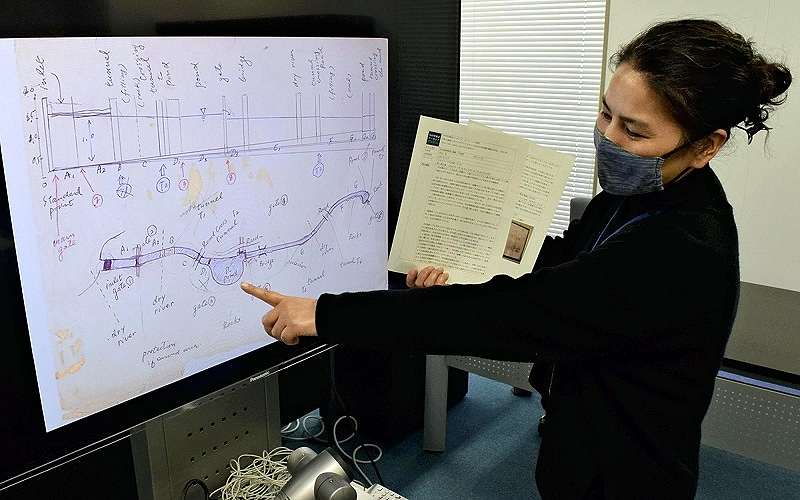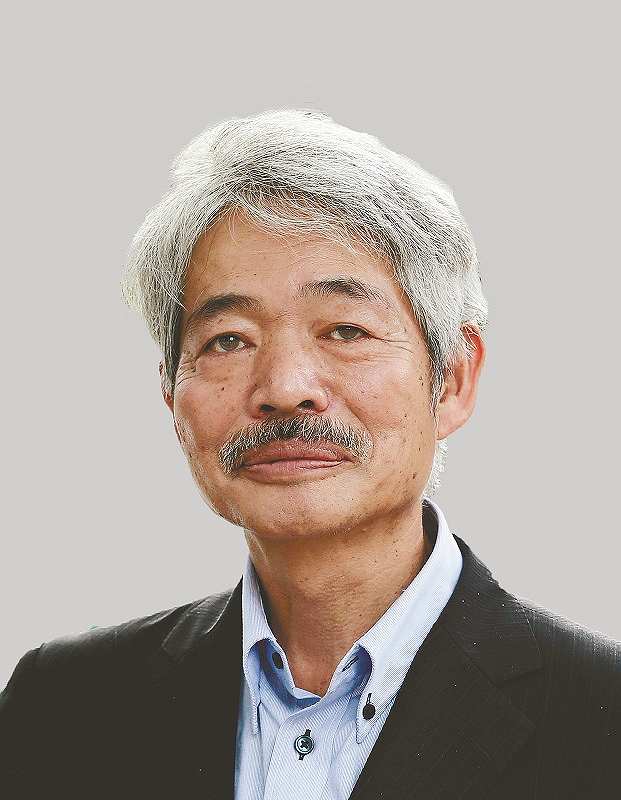
A Kyushu University Library staffer explains a drawing of an irrigation canal construction project, which was hand-drawn by Tetsu Nakamura, in Fukuoka City, on Nov. 24.
21:00 JST, December 5, 2022

Tetsu Nakamura
Three years have passed since Tetsu Nakamura, a Japanese doctor who worked on humanitarian assistance overseas, was fatally shot by members of an armed group in Afghanistan.
To pass on Nakamura’s legacy to the next generation, his alma mater, Kyushu University, has launched an initiative to collect his writings, lecture records and other materials, and make them available in an online archive.
Born in Fukuoka City, Nakamura worked at a hospital after graduating from the university’s Faculty of Medicine in the city. Following a request from locals, he took up a job at a hospital in the northwestern Pakistani city of Peshawar in 1984. Initially, he devoted himself to treating leprosy patients, but expanded the scope of his activities to neighboring Afghanistan, where he organized the building of wells and agricultural canals in drought-stricken areas in 2000.
In March 2021, Kyushu University concluded a mutual cooperation agreement with Peshawar-kai, a private organization based in Fukuoka City, for which Nakamura had served as a representative in Afghanistan, where he was gunned down on Dec. 4, 2019, at the age of 73. The university has since gathered a wide range of materials related to Nakamura and made them publicly available through the “Nakamura Tetsu Digital Archive” on the university library’s website.
As of the end of November, about 750 items — including excerpts from Nakamura’s books, contributions to newspapers and magazines, and photographs depicting his overseas activities — were available on the archive. In October, a plan for an irrigation canal construction project — hand-drawn by Nakamura in 2003 — was added to the archive. The numerous pencil lines suggest that the doctor worked on the project with local engineers, employing a process of trial and error.
A “guide for workers at the Peshawar leprosy center,” which Nakamura created in 1995 for Japanese workers while working to treat leprosy patients in Pakistan, can also be viewed on the site. The guide includes such phrases as, “We do not go there to teach or instruct, but to work together,” and “The activities of the Peshawar-kai can be said to constitute a history of trying to understand the local community.”
Yuko Hori, 53, head of the university library’s e-resource section, said, “We hope these valuable materials will be utilized when people conduct research on Dr. Nakamura.”
Masaru Murakami, the 73-year-old chairman of Peshawar-kai, said, “Thanks to Kyushu University’s initiative, it has become easier to gather materials from various people and organizations other than Peshawar-kai.”
Top Articles in Society
-

Producer Behind Pop Group XG Arrested for Cocaine Possession
-

Man Infected with Measles Reportedly Dined at Restaurant in Tokyo Station
-

Man Infected with Measles May Have Come in Contact with Many People in Tokyo, Went to Store, Restaurant Around When Symptoms Emerged
-

Woman with Measles Visited Hospital in Tokyo Multiple Times Before Being Diagnosed with Disease
-

Australian Woman Dies After Mishap on Ski Lift in Nagano Prefecture
JN ACCESS RANKING
-

Producer Behind Pop Group XG Arrested for Cocaine Possession
-

Japan PM Takaichi’s Cabinet Resigns en Masse
-

Man Infected with Measles Reportedly Dined at Restaurant in Tokyo Station
-

Israeli Ambassador to Japan Speaks about Japan’s Role in the Reconstruction of Gaza
-

Videos Plagiarized, Reposted with False Subtitles Claiming ‘Ryukyu Belongs to China’; Anti-China False Information Also Posted in Japan


















